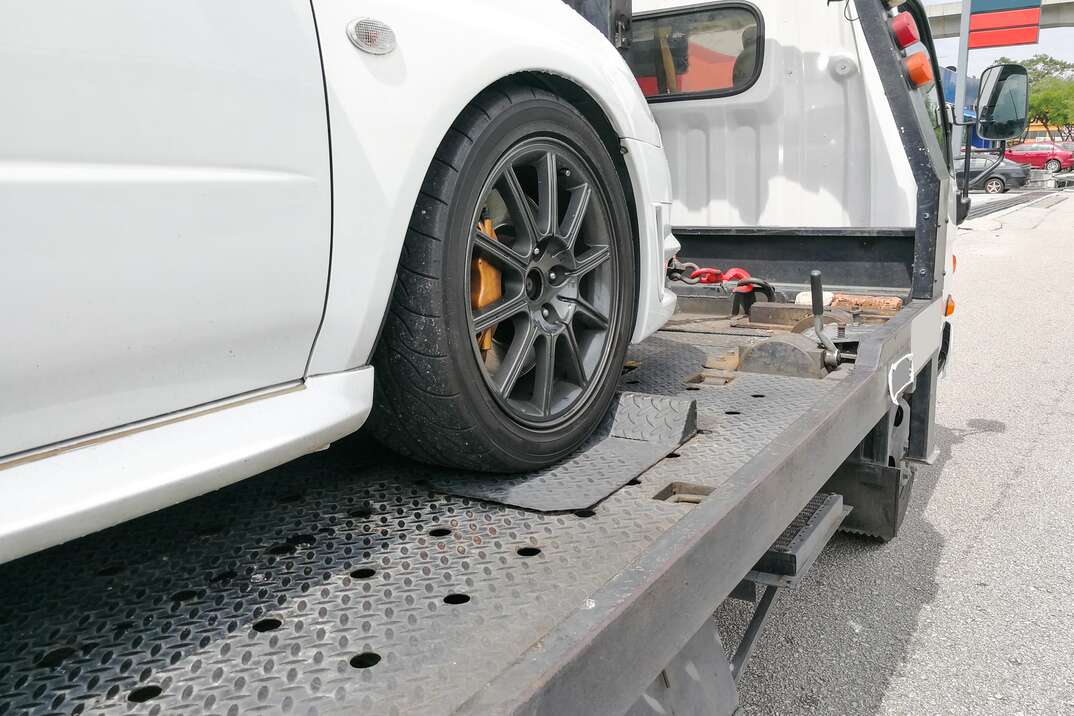- AppliancesElectriciansHVACLandscapingLocksmithPest ControlPlumbingRenovationRoofingT V RepairAll Home Improvement
- Car AccidentClass ActionCorporate LawCriminal DefenseDivorce LawEmployment LawFamily LawFinancial LawLegal AidMedical Injury LawyersMedical MalpracticeReal Estate LawWater Fire RestorationAll Legal
- InvestmentRetirementAll Finance
- Animal InsuranceAutoGeneral InsuranceHealth PolicyHome RentersAll Insurance
- DentalHealth SpecialistsAll Medical
- Animal CareVeterinaryAll Pets
- Auto GlassTowingAll Automotive
Move That Car! How to Have a Car Towed

Regardless of how well-maintained your car is, there's always a possibility of an accident, breakdown or tire blowout. And since you can’t just abandon your vehicle on the side of the highway, you’ll need to have it towed.
Preparation is key. Knowing how to have your car towed can make all the difference in the world when it comes to easing your stress.
How to Get Your Car Towed
One of the most common reasons you might need to have your car towed is because you’ve been in an accident. Having a car towed in this situation is as simple as knowing who to contact. If your auto insurance policy covers towing, your first call should be to your insurance provider. Their phone number should be located on your insurance card. Even if you're calling outside of normal business hours, you can receive this service.
Your insurance provider will then give you information on the next steps you should take. If free towing is available with your insurance policy, your provider should schedule a tow for you, which means that all you need to do is wait for a tow truck to arrive. Most insurance companies partner with preferred towing companies.
If towing isn't freely available with your insurance, your provider should give you quotes from different towing companies. With this information in hand, you can ask your insurance provider to contact the towing company for you. The truck will then be sent to your destination.
Insurance policies differ in regard to towing coverage. If you have a liability-only insurance plan, it's unlikely that towing is covered. In that case, you would need to pay for towing, even after being involved in a car accident. In the event that the other driver was responsible for your accident, it's possible that you will eventually be reimbursed for the cost of having your car towed.
In some situations, towing will be automatically provided if you have a comprehensive auto insurance policy. However, you may need to ask your insurance provider to add towing coverage to your policy, which will likely cost you extra.
Getting a Car Towed to a Dealership
To get your car towed to a dealership, you should first determine if you already have roadside assistance with your vehicle's manufacturer or from the auto dealership where you purchased the vehicle.
If you do, your car may be able to be towed at no cost. Whether you contact roadside assistance or your insurance provider, you can request that your car be towed to a specific dealership.
Getting a Car Towed to a Mechanic
If you want to have your car towed to a mechanic or garage, all you need to do is ask. No matter who you contact to have your car towed, the towing company should be able to transport your vehicle to practically any location. For example, you could have it towed to your home if you don't have the funds to repair the vehicle at the moment.
Can I Get My Car Towed Without Being Present?
It's possible to have your car towed without being physically present. However, there are some important guidelines you should keep in mind. First, it's essential that you remove all valuables from your vehicle before it gets towed.
Your car should also be visible to the truck driver. A lot of people drive black SUVs or white sedans, and you need to make yours stand out. You can make it identifiable by hanging a brightly colored shirt out of your window, opening the hood of the car or turning the headlights on.
How Much Does Towing Cost?
The cost of towing your vehicle depends on several factors. The main one is how far the car needs to be towed. Greater distances will invariably cost more. If you have free coverage through your insurance provider, your car should be towed without requiring you to pay. According to J.D. Power, the national average price for a tow is around $109. If you need a long-distance tow, you could be charged $4 to $5 or more per mile.
How to Get Someone Else's Car Towed
There are several situations that may require you to have someone else's car towed. The most common of these is if the vehicle is parked on your property. In this scenario, you could call the police. According to FindLaw, if the car is illegally parked on your property, you may not be responsible for towing costs. The police can also figure out who owns the car and contact them. You can call a towing company to take the car away, though they’ll probably charge you a fee.
Note that this process applies to cars parked on private, residential property. Laws vary when it comes to cars parked in other spaces. The safest bet is to contact the police before you call for the vehicle to be towed.
Elocal Editorial Content is for educational and entertainment purposes only. Editorial Content should not be used as a substitute for advice from a licensed professional in your state reviewing your issue. The opinions, beliefs and viewpoints expressed by the eLocal Editorial Team and other third-party content providers do not necessarily reflect the opinions, beliefs and viewpoints of eLocal or its affiliate companies. Use of eLocal Editorial Content is subject to the
Website Terms and Conditions.The eLocal Editorial Team operates independently of eLocal USA's marketing and sales decisions.



